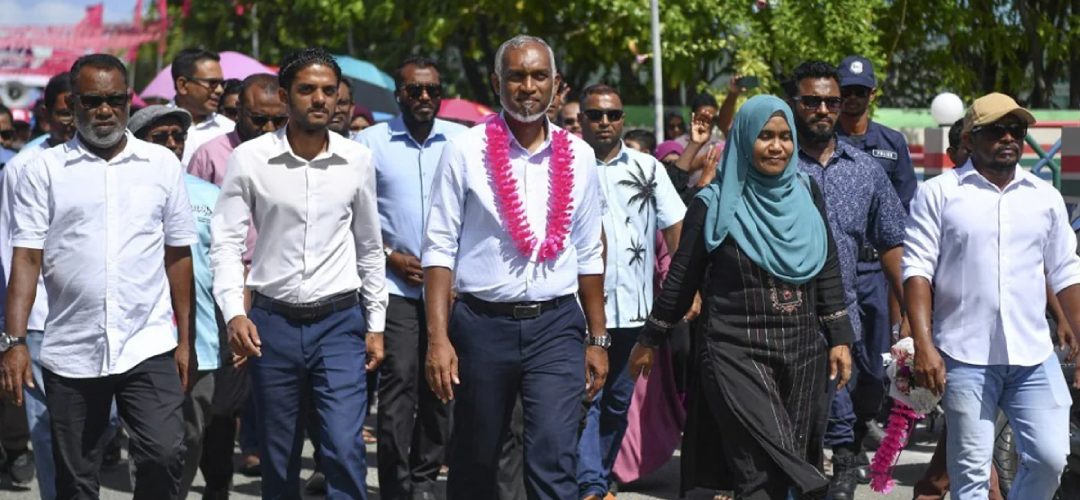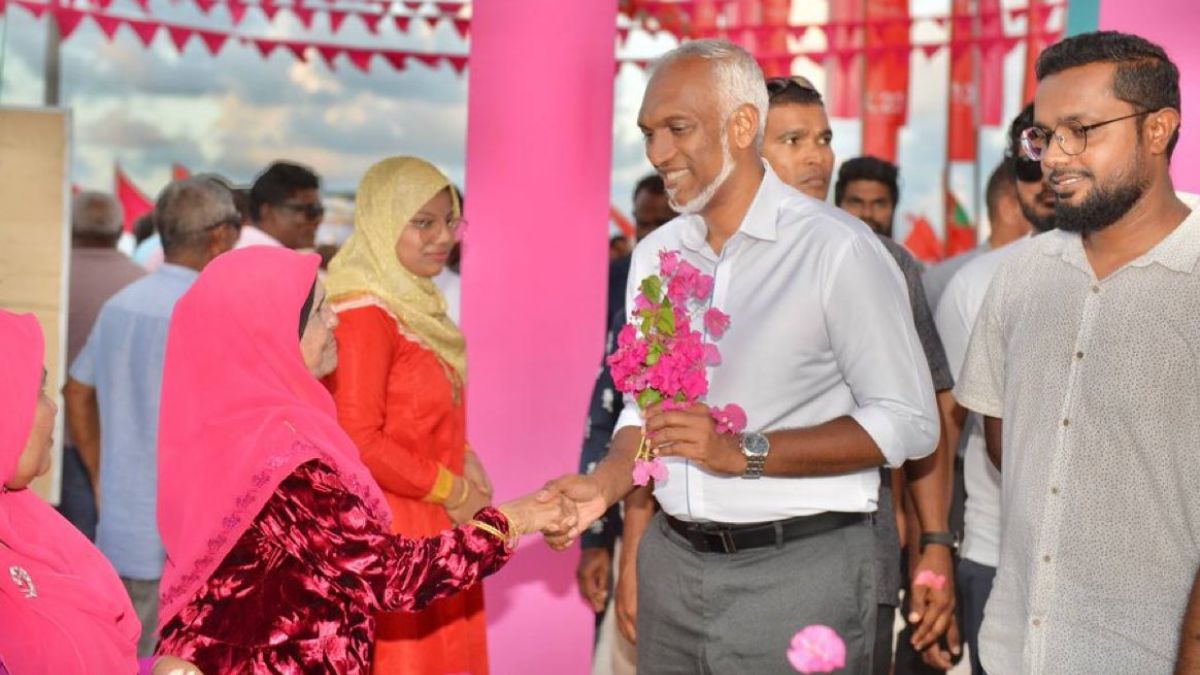Maldives Elections & Regional Geopolitics
October 7, 2023 | Expert Insights

India considers the Indian Ocean a stretch of real estate that is critical not only for its security but also for its trade. The sea lanes of communications that transit through the ocean are its lifelines, just as they are for our bigger neighbour, China. To secure these sea routes, having the island nations astride them on your side is essential. Not only do they provide a base for operations, but they also act as eyes and ears for continuous maritime domain awareness in these times of no war-no peace.
Despite its small size, the Maldives is strategically important given its central location in the Indian Ocean, making it attractive to both China and India as they jostle for strategic advantage over the vast open expanses of the Indian Ocean.
Little wonder the electoral battle in the Maldives was of intense interest in India, as surely it would be in Beijing; both powers want Male on their team, and whoever rules the Maldives would be the key to this objective.
The suspense is finally over; Mohamed Muizzu, the opposition coalition candidate (People's National Congress-Progressive Party of Maldives), has been unambiguously elected as the President, winning around 45 per cent of the vote. The incumbent President, Mr Ibrahim Solih of the Maldivian Democratic Party (MDP), trailed behind with 56 per cent. The run-off vote showed a higher electorate turnout of 86 per cent compared to the inconclusive first round, with a historical low of 79.85 per cent.
Background
India has had a long-standing relationship with the Maldives. Both countries share a maritime border. There has been deep cooperation in the strategic, military and economic spheres. This cooperation has been mutually beneficial.
The Indian Armed Forces have played a crucial role in maintaining Maldive's security. There are no territorial disputes between New Delhi and Male. A large amount of financial assistance has been provided to this country by India over the years. This assistance has been given without any pre-conditions.
When COVID-19 struck, Maldives was especially severely impacted by the virus andd economy due to the global lockdown of the industry. Indi as a tourism-based economya had then stepped in, keeping the Maldivian economy afloat by extending credit and airlifting 100,000 doses of vaccine to protect the tourist industry workers, which enabled the Maldives to be one of the first global tourist destinations to welcome tourists to their famed beaches.
India’s foreign policy towards Maldives has been based on its “neighbourhood first” principle. Under this, the first external priority of the Indian government falls within its neighbourhood. Within this, Maldive's maritime, geo-strategic location makes it all the more important for India. Maldives has reciprocated this with its "India first" policy. Over the years, anti-India feelings have also developed in the Maldives. And countries such as China have exploited these sentiments to the fullest.

Analysis
Maldives is unique to India in several respects. A Muslim-majority country, it has had a history of a close working partnership with India. It is also one of the few countries where Indian foreign military intervention has succeeded. This was during the 1988 coup d’etat attempt in the country when the Indian armed forces secured the national government.
So, based on all this, India should have no issues with Maldives. It has done all the right things in this country. Still, many Maldivians continue to look at it as a hegemonistic power. Why is this the case? Could it be that while the intent has been right, the messaging has been wrong?
Strong government-to-government relations are one aspect of bilateral ties. But this is not enough to build a robust alliance. Something more is required. This is vibrant people-to-people contacts. Such contacts are the foundation of any robust engagement. This is where India has fallen short in the Maldives, even though last year India outstripped China in sending a record number of tourists to the islands.
The anti-incumbency campaign started by the former President, now in jail for corruption, Abdullah Yameen of People’s National Congress, demanded ‘India Out’ in contradiction to Solih’s "Look India". This had a popular ring to it because the Indian presence in Male was conspicuous by an insignificant number of Indian Coast Guard personnel assisting the Maldivian Coast Guard to man and operate coastal surveillance radars, etc., as well as a few coast guard cutters. During Yameen’s presidency (2013-2018), Maldives joined China’s Belt and Road Initiative. It is widely believed that Yameen is Mohamed Muizzu’s political mentor.
Predictably, Solih banned the "India Out" campaign, particularly because of prevalent xenophobia towards Indians, a move that clearly was seen as anti-national by the voters and apparently cost him the elections.
Not expected to emerge as the front runner early on in the election campaign, Mohamed Muizzu picked up the strains of Solih’s India Out campaign and, playing upon the anti-incumbency factor reinforced by the dwindling economy, emerged as the front runner when votes were cast in the end September. His party, the People's National Congress, is heavily supportive of China.
Solih suffered a major political setback when Mohamed Nasheed, a charismatic politician, exited his party to field an independent candidate. This lost Solih considerable support in the run-off.
The India factor was a causative one for the loss of Solih, which gives rise to an impression that perhaps the robust policy India has been following in the Maldives has sent an incorrect message to its population. It has to be more circumspect in putting across the security dimensions of any relationship while making much of the economic side. This is something India has to learn from China. Even with its supposed allies, Beijing is more adept at playing a double game.
This lack of an Indian common touch with Maldives has played into the hands of anti-India forces here. They have tried to portray that Male has become a virtual colony of New Delhi. All the Indian good work has been side-lined in this narrative. Pro-Indian Maldivians have not responded in kind. They have left the field open for the pro-China elements.
Yet, India can look back with a degree of satisfaction on the progress made in relations between India and Maldives under the Solih government. India followed a development-centric approach towards the Maldives in this period. A special emphasis was placed on High Impact Community Projects by both sides. The Solih government had seen the damage that China had done to their country. So, it decided to move closer to India. India also launched ground-level projects in the Maldives. These include programs related to youth employability and entrepreneurship. These initiatives have turned out to be extremely beneficial for Maldives. This momentum must be sustained even under the new dispensation.
Assessment
- New Delhi has to review its Maldivian strategy; perhaps tone down the security part a bit and emphasise more on the climate and development side. Indian diplomacy is too mature to be miffed or sulk because its favourite has been shown the door; it must work with the new dispensation and keep the relationship alive and kicking despite the provocations.
- However, winning the election is only the first step for the newly elected President; the real task lies ahead, and the going is all uphill. The country faces mounting debt, a poor state of foreign reserves and the dubious distinction of being a leading victim of rising sea levels from global warming. Spread over 1200 coral islands, the nation's progress has been concentrated on its capital, Male, while hundreds of inhabited atolls lack even the most basic amenities. Thus, political statements apart, Mr Muizzu needs India as much as he needs China. So, one will not be surprised that once in the Presidential house, he will work out a process of strategic balancing between the two giants to extract the most from both.
- There is a strong groundswell for support for India in the Maldives. To engage with them, New Delhi has to move beyond government-to-government relations and focus more on people-to-people diplomacy. China replacing India in Maldives is not only New Delhi’s loss. The West, too, will lose out on a key nation in the Indian Ocean.








Comments